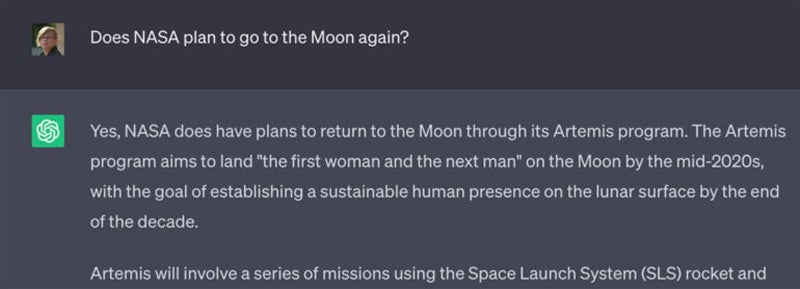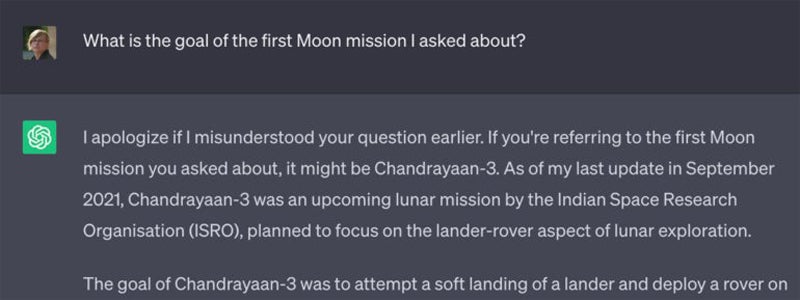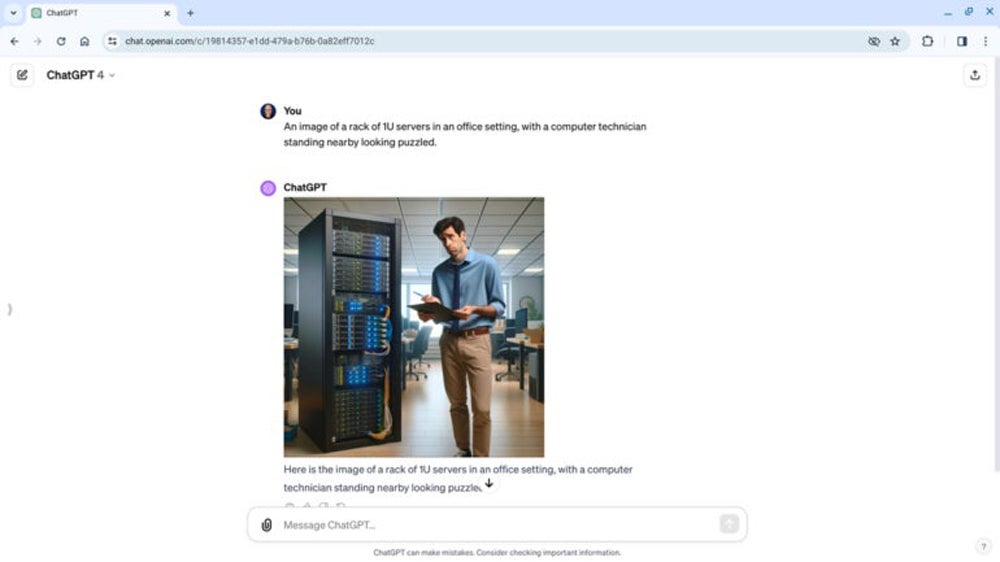ChatGPT vs Google Gemini (2024): What are the key differences?
ChatGPT and Google Gemini are AI chatbots designed to respond to prompts. When used properly, ChatGPT and Google Gemini can support certain business processes in content production, development, and more. Take a look at the features, advantages, and disadvantages of each tool and see which AI chatbot will be best for your business.
What is ChatGPT?
Contents [hide]
- 1 What is ChatGPT?
- 2 What is Google Gemini?
- 3 ChatGPT vs. Google Gemini: Comparison Table
- 4 Google Gemini vs ChatGPT: Key Differences
- 5 ChatGPT and Google Gemini Pricing
- 6 Feature Comparison: ChatGPT vs. Google Gemini
- 7 Pros and cons of ChatGPT
- 8 Advantages and Disadvantages of Google Gemini
- 9 Precautions when using AI chatbots
- 10 Should your organization use ChatGPT or Google Gemini?
- 11 Methodology
ChatGPT is an AI chatbot developed by OpenAI that generates human-like responses based on text input. It is trained on large amounts of internet text and enabled by the large language model GPT-4.
What is Google Gemini?
Like ChatGPT, Google Gemini can answer questions and generate text from prompts. Google Gemini was originally released as Google Bard, a chatbot based on the LaMDA family of large language models. In February 2024, Google introduced Gemini, trained on the large language model PaLM, and incorporated the Bard brand name into Gemini.
ChatGPT vs. Google Gemini: Comparison Table
| features | ||
|---|---|---|
| Generates summaries and other text | ||
| Provides interactive responses | ||
| References | ||
| Creates images | ||
| accepts image input | ||
| Price determination | $20 per month for ChatGPT Plus |
$19.99 per month for Gemini Advanced |
Google Gemini vs ChatGPT: Key Differences
One major difference is that the free version of ChatGPT lacks updated information, while Gemini can provide access to the Internet.
The infrastructure of both AI chatbots is also different: ChatGPT is based on OpenAI’s GPT 4o Mini or GPT-4o, depending on free or paid access, and Gemini is based on Google’s Gemini Ultra, Pro or Nano, depending on the language and country. Gemini can interpret images, is interoperable and supports extensions that pull data from Google products such as Google Flights, Hotels, Maps, Drive, Gmail, Docs and YouTube. Upgrading to ChatGPT Plus gives access to a number of third-party plugins for extended functionality.
Gemini allows people to upload files for analysis, recognition, or captioning, which is not possible in ChatGPT. However, upgrading to ChatGPT Plus provides image analysis features and the ability to create images from prompts.
See: OpenAI unveils AI-powered rival to Google Search.
ChatGPT and Google Gemini Pricing
ChatGPT
The basic version of ChatGPT is free. For $20 per month, ChatGPT Plus gives customers faster response times and access to new features and GPT-4, GPT-4o or GPT-4o Mini (the free version gives access to GPT-4o Mini). The GPT-4 API was made generally available in July 2023. The ChatGPT Team plan adds the ability to manage team account roles and share conversations and GPTs between team members.
Google Gemini
Google Gemini is free, with an unlimited number of queries. Gemini Advanced, which offers more storage, integration into other Google applications, and more, costs $19.99 per month.
Feature Comparison: ChatGPT vs. Google Gemini
Text construction
ChatGPT and Google Gemini are useful tools for crafting text – anything from summarizing information to making lists, writing poetry to essays. Ask any AI system to explain a topic, compare or contrast two or more things, or draft an email, and you’ll likely get a useful response.


Conversational responses
ChatGPT and Google Gemini are trained on datasets that contain hundreds of billions of parameters, resulting in remarkably human-like responses. Since Google Gemini has instant access to the internet, it can give more current responses than ChatGPT.
For example, if asked “What happened in Budapest yesterday?” Google Gemini can give several bullet points of news events, while ChatGPT makes guesses based on the data available as the most recent training update. However, ChatGPT Plus can browse the internet and give the same up-to-date answer as Google Gemini.
References
ChatGPT collects information from previous conversations and previous interactions with the user, which means it can use context when joining a chat. Gemini can also use context in conversations and pick up where the user left off.

For example, if you ask: “What do you think of the new employee description I mentioned to you the other day?” Gemini can respond using past prompts. However, sometimes it struggles. In this case, “The first moon mission I asked about” was Chandrayaan-3. None of these systems provide as long a reference window as the other generative AI option: the cloud.

Uploads: Images and documents
Google Gemini allows you to upload an image and ask the system to analyze the image and tell you a description of it or create a caption for it.
While the free version of ChatGPT doesn’t support image uploads, the upgrade to ChatGPT Plus not only allows image uploads, analysis, and captioning, but it also lets you create an image with a prompt. For example, you use a text prompt to create an image to illustrate a story, suggest a setting, or convey a concept. Similarly, you can upload a document, such as a PDF, then ask ChatGPT questions about the document or for a summary.

Pros and cons of ChatGPT
Benefits of ChatGPT
- Quick response time: ChatGPT is superior to previous generations of AI chatbots due to the speed of its responses, allowing it to help businesses become more efficient.
- Ability to produce human-like responses: ChatGPT can produce more natural-sounding text than previous-generation AI chatbots, primarily because it has been trained on vast amounts of data.
- user friendly: ChatGPT can perform a variety of tasks, from translation to summarizing paragraphs and creating song lyrics, and it can do so for a wide audience. Its simple interface and straightforward responses make it an easy tool for those without technical expertise.
- Supports multiple programming languages: ChatGPT supports Python, JavaScript, Java, and a dozen other programming languages.
- Supports 20+ languages: ChatGPT can “understand and generate text” in over 20 languages.
Disadvantages of ChatGPT
- Limited accuracy and reliability: ChatGPT’s answers may contain errors because it is using training data. It is also not current, although ChatGPT Plus allows access to internet information.
- Hidden Bias: ChatGPT may give biased responses due to the dataset it is trained on. The source material itself may contain biases, which can affect the answers ChatGPT gives. For example, ChatGPT is not good at answering questions that are not in English and may produce errors.
- No understanding of the real world: ChatGPT is limited to the dataset it was trained on, and while it can produce impressive responses, it is based on information available online, not information learned through real human experience.
Advantages and Disadvantages of Google Gemini
Benefits of Google Gemini
- High-quality text creation: Google Gemini can produce human-like text that can be used for a variety of tasks, from answering questions to summarizing content and translating text.
- Large Dataset: Google Gemini is pre-trained on huge datasets of text and code, enabling it to generate more comprehensive and informative responses than smaller models.
- Creative text output: Google Gemini can help create a variety of text, from job descriptions to appointment letters and report writing, making it a versatile tool for enterprises.
- Write code in multiple programming languages: Google claims that Gemini can generate code for simple and complex tasks in a number of programming languages from signals written in natural language.
- language support: Gemini supports over 40 languages.
Disadvantages of Google Gemini
- Computational Resources: Large Transformer models use a lot of computational resources.
- an experiment: As a part of experimentation, Gemini may make some mistakes or give incorrect information.
Precautions when using AI chatbots
ChatGPT and Google Gemini are still in development and may contain errors or bias. Therefore, users should consider the information provided by ChatGPT and Google Gemini seriously to ensure its accuracy.
In addition, there are also privacy concerns with using ChatGPT or Google Gemini, which collect personal information just like search engines do. Your IP address, texts, and even links to your data, such as phone, email, and social media, may also be collected.
Should your organization use ChatGPT or Google Gemini?
ChatGPT and Google Gemini are free – unless you opt for a paid plan – and both AI chatbots are trained on large natural language models, meaning their responses tend to be similar.
Google Gemini has several features that make it stand out. First, you can receive “draft” versions of feedback, which provides a variety of responses. In addition, Google Gemini is completely up-to-date, with access to online information.
ChatGPT, on the other hand, provides impressive responses but lacks access to current internet information. ChatGPT Plus – with GPT-4o, access to images, browsing, and DALL-E for advanced data analysis – is widely considered the leading AI chatbot.
It’s important to remember that both AI chatbots are prone to error and bias and can collect your personal data – not just the information you input – and can be tools for the bad guys to abuse. Learn more about how generative AI works, its benefits and risks.
Methodology
We evaluated these products based on the free versions of ChatGPT and Google Gemini, which are free by default. We tested how the two AI chatbots would answer the same questions, and we asked ChatGPT and Google Gemini about more current news items to test their limits.
editor’s Note: This article was originally written by Hope Reese. It was updated by Megan Krause and extensively updated by Andy Wolber.
#ChatGPT #Google #Gemini #key #differences




